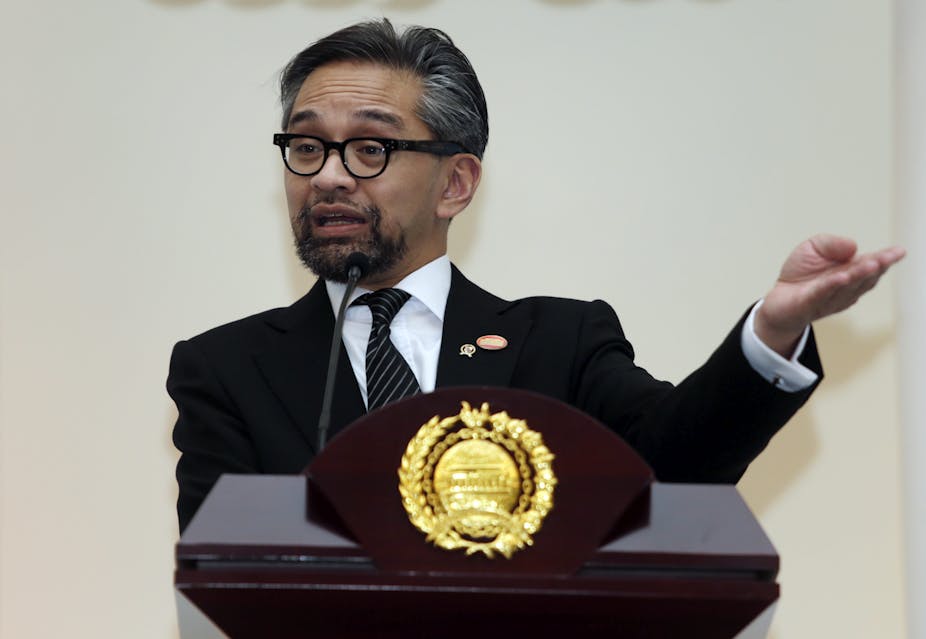For anyone interested in Australia-Indonesia relations, nothing so characterises the phenomenon as a car on a roller-coaster. Any rise is followed inevitably by a fall. The ride is never boring, and in a bizarre kind of way it is quite predictable. But sometimes you might hope for a little more stability, a few more moments of calm.
The latest plunge in the relationship has been prompted by revelations that Australia has been intercepting electronic communications in Indonesia. The Australian Ambassador to Indonesia, Greg Moriarty, has been called into the Indonesian Ministry of Foreign Affairs to explain his government’s position.
Indonesian foreign minister Marty Natalegawa has warned that if Australia does not acknowledge what it has done, and promise not to do it again, intelligence co-operation in areas such as people smuggling will be at risk.
All very serious, apparently.
But first a reality check. Natalegawa is a highly experienced former senior diplomat who has represented his country as Ambassador to the UN and to the UK. He has a master’s degree from Cambridge and a PhD from the ANU. His international travel bill would rival that of Kevin Rudd. I would be gobsmacked if he learnt anything new about our intelligence-gathering activities in Indonesia from Edward Snowden’s revelations.
What the revelations have done, though, is to put these allegations into the public arena. And here any political leader must act concerned, must protest their shock and horror, and must demand an end to these activities immediately. Our leaders would do this if it was publicly revealed that the Indonesian embassy in Canberra was tapping Tony Abbott’s mobile phone. In this sense, Natalegawa’s statements follow a predictable script.
In addition, though, Natalegawa is playing to a domestic audience which is highly sensitive to suggestions of foreign meddling in Indonesian affairs. In part, this might be seen in the context of next year’s parliamentary and presidential elections.
But even without such elections, Natalegawa would be pressed to act. One leading international law scholar, Professor Hikmahanto Juwana of the University of Indonesia, summed up the situation this way:
If the government does not take a strong and firm stand, the anger of the Indonesian people will be redirected from the US and Australia to the government, and even to President Yudhoyono.
Just as tellingly, Juwana said that if the government’s position ended up being one of “business as usual”, it would look particularly strange, given that even Indonesia’s neighbour Malaysia had taken a strong stand on the issue. To be thought of as less nationalistic and less firm with foreigners than Malaysia is something no self-respecting government of Indonesia would risk.
Yet in an interesting reversal of logic, some elements in Indonesia seem to be quietly pleased by the spying revelations. Nobody spies on countries which are of no significance internationally, or who have no secrets worth knowing. Therefore, the fact that Australia - and more significantly the US - has been spying on Indonesia is proof of the country’s importance.
As one commentator wrote, in an article carried by the state-run Antara news agency:
Given its geopolitical and geostrategic significance, it is no wonder that Indonesia is the target of bugging by foreign agencies with a variety of interests in Indonesia.
Foreign interests always want to know more about what is happening in Indonesia, and what might happen here.
The same article quoted retired Major-General Glenny Kairupan, a former senior official of the Strategic Intelligence Agency, as saying that Indonesia was naturally the target of bugging by various foreign interests because Indonesia is of such strategic significance.
It is also interesting that as there is still no full-time Indonesian news correspondent based in Australia, the reports of the bugging episode in the Indonesian press are generally sourced from stringers or from foreign news agencies. And in an ironic turn of events, probably the most frequently used foreign news source is the Indonesian language service of the ABC’s Radio Australia.
How important is this issue in the broad sweep of Indonesian politics? It has certainly grabbed some headlines – but so have the various Australian parliamentary travel rorts, which many Indonesians seem to have read about with some relief as showing that their politicians are not the only ones with their hands in the public till.
The renewed discussions about live cattle exports has attracted some attention too. Domestically, the issue cannot compete with the news that prominent businessman Ahmad Fathanah, who is associated with the Islamist party PKS, has been sentenced to 14 years jail for corruptly manipulating quotas of beef imports.

Will Jakarta follow up on Natalegawa’s threat to cut intelligence sharing on people smuggling? Not because of this issue – though we need to remember that Australian and Indonesian interests on people smuggling are not exactly parallel. While the Australian government wants to stop people smugglers bring asylum seekers into the country, the Indonesian government wants to get asylum seekers out of theirs.
But on most other issues on which intelligence is shared - mostly notably terrorism - Jakarta has at least as much to lose as Australia if the sharing were to be halted. Jakarta is not going to cut off its nose to spite its face. So expect a bit more bluster, but no significant, concrete action.
The car on the roller-coaster will soon reach its nadir and start its climb upwards again, back to the status quo.
The more things change…

